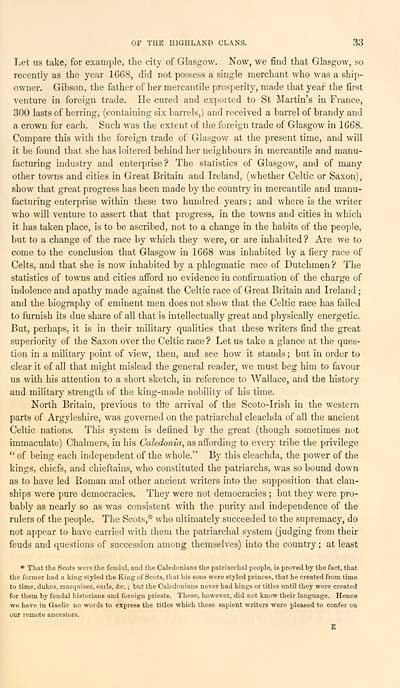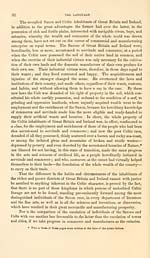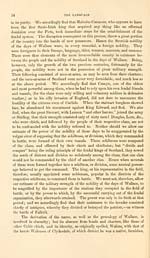Download files
Complete book:
Individual page:
Thumbnail gallery: Grid view | List view

OF THE HIGHLAND CLANS. 33
Let US take, for example, tlie city of Glasgow. Now, we find that Glasgow, so
recently as the year 1668, did not possess a single merchant who was a ship-
owner. Gibson, the father of her mercantile prosperity, made that year the first
venture in foreign trade. He cured and exported to St Martin's in France,
300 lasts of herring, (containing six barrels,) and received a barrel of brandy and
a crown for each. Such was the extent of the foreign trade of Glasgow in 1668.
Compare this with the foreign trade of Glasgow at the present time, and will
it be found that she has loitered behind her neighbours in mercantile and manu-
facturing industry and enterprise? The statistics of Glasgow, and of many
other towns and cities in Great Britain and Ireland, (whether Celtic or Saxon),
show that great progress has been made by the country in mercantile and manu-
facturing enterprise within these two hundred years ; aud where is the writer
who will venture to assert that that progress, in the towns and cities in which
it has taken place, is to be ascribed, not to a change in the habits of the people,
but to a change of the race by which they were, or are inhabited ? Are we to
come to the conclusion that Glasgow in 1668 was inhabited by a fiery race of
Celts, and that she is now inhabited by a phlegmatic race of Dutchmen ? The
statistics of towns and cities afford no evidence in confirmation of the charge of
indolence and apathy made against the Celtic race of Great Britain and Ireland ;
and the biography of eminent men does not show that the Celtic race has failed
to furnish its due share of all that is intellectually great and physically energetic.
But, perhaps, it is in their military qualities that these writers find the great
superiority of the Saxon over the Celtic race ? Let us take a glance at the ques-
tion in a military point of view, then, and see how it stands ; but in order to
clear it of all that might mislead the general reader, we must beg him to favour
us with his attention to a short sketch, in reference to Wallace, and the history
and military strength of the king-made nobility of his time.
North Britain, previous to the arrival of the Scoto-Irish in the western
parts of Argyleshire, was governed on the patriarchal cleachda of all the ancient
Celtic nations. This system is defined by the great (though sometimes not
immaculate) Chalmers, in his Caledonia, as afi'ording to every tribe the privilege
" of being each independent of the whole." By this cleachda, the power of the
kings, chiefs, and chieftains, who constituted the patriarchs, was so bound down
as to have led Roman and other ancient writers into the supposition that clan-
ships were pure democracies. They were not democracies ; but they were pro-
bably as nearly so as was consistent with the purity and independence of the
rulers of the people. The Scots,* who ultimately succeeded to the supremacy, do
not appear to have carried with them the patriarchal system (judging from their
feuds and questions of succession among themselves) into the country ; at least
* That the Scots were the feudal, and the Caledonians the patriarchal people, is proved by the fact, that
the former had a king styled the King of Scots, that his sons were styled princes, that he created from time
to time, dukes, marquises, earls, &c. ; but the Caledonians never had kings or titles until they were created
for them by feudal historians and foreign priests. These, however, did not know their language. Hence
we have in Gaelic no words to express the titles which these sapient writers were pleased to confer on
our remote ancestors.
E
Let US take, for example, tlie city of Glasgow. Now, we find that Glasgow, so
recently as the year 1668, did not possess a single merchant who was a ship-
owner. Gibson, the father of her mercantile prosperity, made that year the first
venture in foreign trade. He cured and exported to St Martin's in France,
300 lasts of herring, (containing six barrels,) and received a barrel of brandy and
a crown for each. Such was the extent of the foreign trade of Glasgow in 1668.
Compare this with the foreign trade of Glasgow at the present time, and will
it be found that she has loitered behind her neighbours in mercantile and manu-
facturing industry and enterprise? The statistics of Glasgow, and of many
other towns and cities in Great Britain and Ireland, (whether Celtic or Saxon),
show that great progress has been made by the country in mercantile and manu-
facturing enterprise within these two hundred years ; aud where is the writer
who will venture to assert that that progress, in the towns and cities in which
it has taken place, is to be ascribed, not to a change in the habits of the people,
but to a change of the race by which they were, or are inhabited ? Are we to
come to the conclusion that Glasgow in 1668 was inhabited by a fiery race of
Celts, and that she is now inhabited by a phlegmatic race of Dutchmen ? The
statistics of towns and cities afford no evidence in confirmation of the charge of
indolence and apathy made against the Celtic race of Great Britain and Ireland ;
and the biography of eminent men does not show that the Celtic race has failed
to furnish its due share of all that is intellectually great and physically energetic.
But, perhaps, it is in their military qualities that these writers find the great
superiority of the Saxon over the Celtic race ? Let us take a glance at the ques-
tion in a military point of view, then, and see how it stands ; but in order to
clear it of all that might mislead the general reader, we must beg him to favour
us with his attention to a short sketch, in reference to Wallace, and the history
and military strength of the king-made nobility of his time.
North Britain, previous to the arrival of the Scoto-Irish in the western
parts of Argyleshire, was governed on the patriarchal cleachda of all the ancient
Celtic nations. This system is defined by the great (though sometimes not
immaculate) Chalmers, in his Caledonia, as afi'ording to every tribe the privilege
" of being each independent of the whole." By this cleachda, the power of the
kings, chiefs, and chieftains, who constituted the patriarchs, was so bound down
as to have led Roman and other ancient writers into the supposition that clan-
ships were pure democracies. They were not democracies ; but they were pro-
bably as nearly so as was consistent with the purity and independence of the
rulers of the people. The Scots,* who ultimately succeeded to the supremacy, do
not appear to have carried with them the patriarchal system (judging from their
feuds and questions of succession among themselves) into the country ; at least
* That the Scots were the feudal, and the Caledonians the patriarchal people, is proved by the fact, that
the former had a king styled the King of Scots, that his sons were styled princes, that he created from time
to time, dukes, marquises, earls, &c. ; but the Caledonians never had kings or titles until they were created
for them by feudal historians and foreign priests. These, however, did not know their language. Hence
we have in Gaelic no words to express the titles which these sapient writers were pleased to confer on
our remote ancestors.
E
Set display mode to: Large image | Transcription
Images and transcriptions on this page, including medium image downloads, may be used under the Creative Commons Attribution 4.0 International Licence unless otherwise stated. ![]()
| Early Gaelic Book Collections > Blair Collection > Treatise on the language, poetry, and music of the Highland clans > (45) |
|---|
| Permanent URL | https://digital.nls.uk/76236898 |
|---|
| Description | A selection of books from a collection of more than 500 titles, mostly on religious and literary topics. Also includes some material dealing with other Celtic languages and societies. Collection created towards the end of the 19th century by Lady Evelyn Stewart Murray. |
|---|
| Description | Selected items from five 'Special and Named Printed Collections'. Includes books in Gaelic and other Celtic languages, works about the Gaels, their languages, literature, culture and history. |
|---|

